Home » Projects
Category Archives: Projects
The Interview with Professor Marian Wesoły Available with English Subtitles
We are very glad to announce that finally, after two years, the interview with Professor Marian Wesoły is available online with English subtitles on the website of the project Oral History and the Classics, here. We have already reported on shooting this interview here.
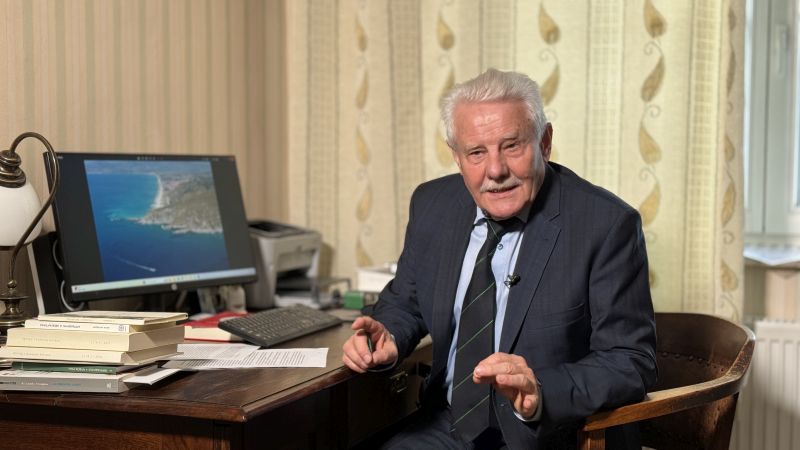
Professor Wesoły, at his desk at home, talked about his intellectual biography, his teachers, collaborators, colleagues, correspondents, about his academic adventures at research centres in Germany (Tübingen) and Italy (Naples), books and editions, and many other fascinating issues. Moreover, he shared his views on prospective developments of research in the field of ancient philosophy.
We want to encourage you, once again, to click here and watch the video.
An Interview with our Vilnius Colleagues
As we announced this autumn, Research Council of Lithuania had decided to fund a research project on the reception of ancient philosophy in Vilnius University in the 20th century. Doc. dr Jonas Čiurlionis (Vilnius University) is the PI in this project, who leads the team consisting of dr Mindaugas Stoškus (VU) and dr hab. Tomasz Mróz (University of Zielona Góra).
This post is to advertise the interview with M. Stoškus and J. Čiurlionis, who talked about the project, its premises and objectives. The interview in written form has been recently published on the VU Faculty website in Lithuanian.

Both, J. Čiurlionis and M. Stoškus, focusing on Lithuanian period in the history of VU (1940-now), emphasised the need of philosophers to confront their outlooks, methods, and the very understanding of what philosophy is with ancient philosophers. They both spoke about their lecturers and how they had referred to the Greeks. We cannot agree more with them regarding their views on significance of Greek philosophy for each Western philosopher, philosophical current and national philosophical tradition. Thus it is important to research and assess the impact of Greek ideas on more recent philosophers, for the history of philosophy is not a linear development, but a constant reference to the roots of philosophical thinking. And the core aim of the project is to research who of the VU philosophers in the 20th century, why and how referred to and reflected on ancient philosophers.
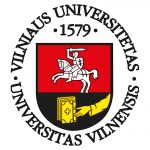
A Centenary of the Kosciuszko Foundation
This year a merited institution supporting the development of Polish sciences, arts and humanities, Kosciuszko Foundation, celebrates its centennial anniversary. A decade ago Tomasz Mróz was a Kosciuszko Fellow at the University of Iowa, in the Department of Classics, whose Head at that time was Professor John Finamore.
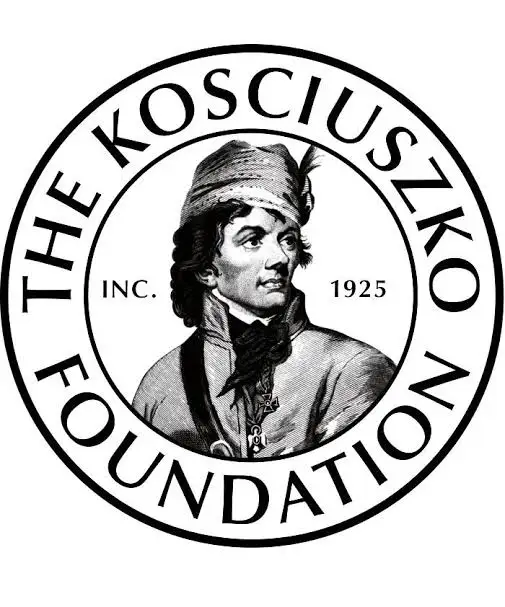
On October 21st, 2025, in lecturing hall of the university’s library in Zielona Góra, T. Mróz delivered a talk about the history of the Kosciuszko Foundation and exchange programs for Polish scholars to pursue research visits in American academic institutions. The talk was based on the presentation provided by The Kosciuszko Foundation Alumni, but its basic aim was to encourage prospective grantees to submit their project proposals and spend a couple of months in American universities. Moreover, Mróz shared his experience of preparing his proposal, of the interview and of many practical details of his 5 months research stay at the University of Iowa. The audience at the meeting was not numerous, yet highly motivated to develop their academic careers with support of the Foundation. A brief report from the meeting was published on the website of the University of Zielona Góra and on social media of the The Kosciuszko Foundation Alumni.
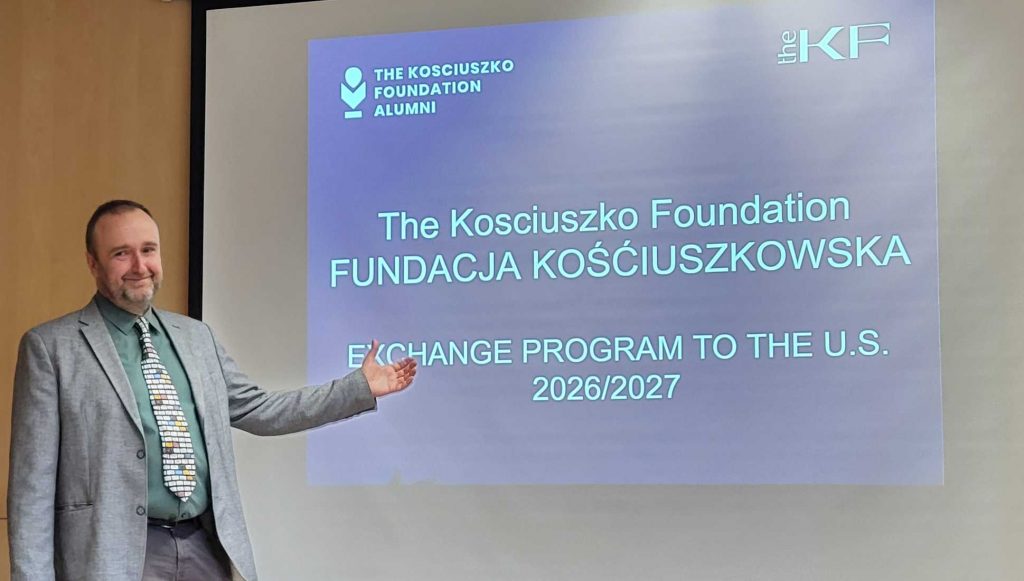
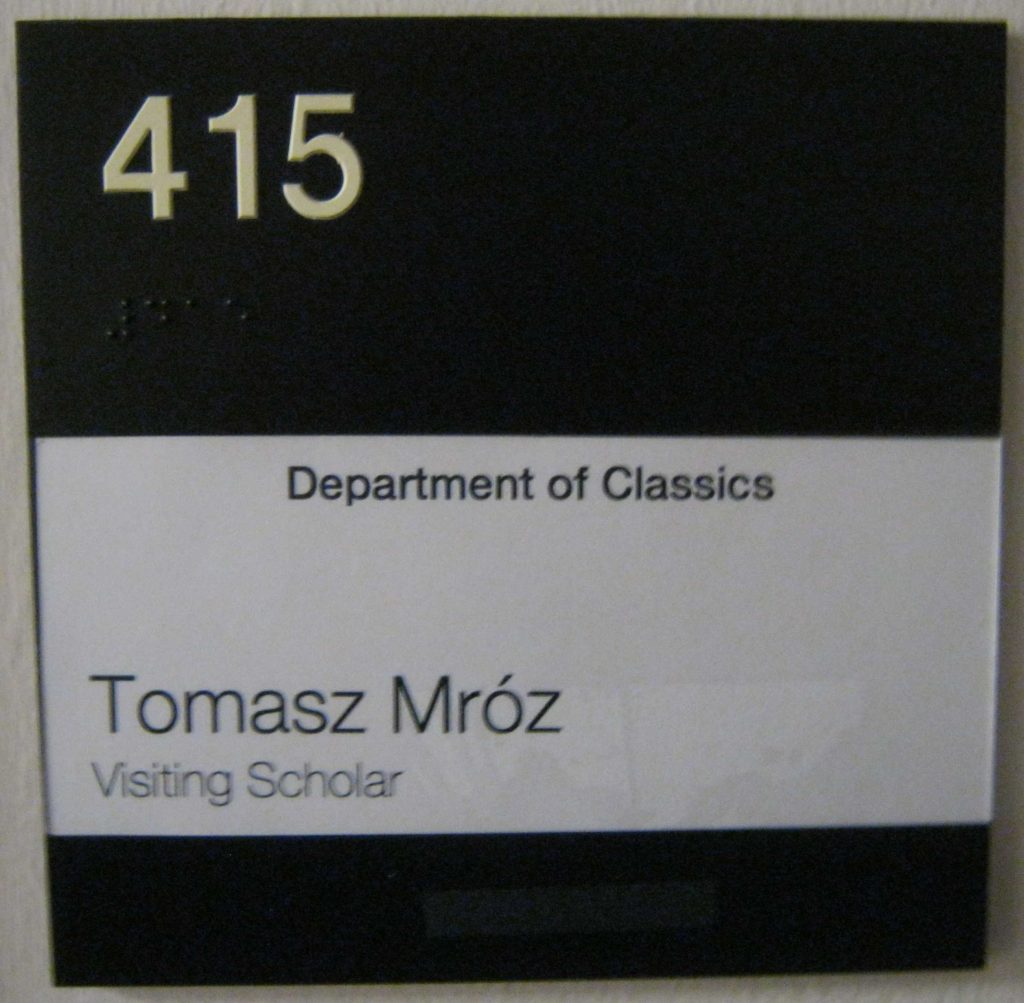
The talk induced Mróz to recall some memories of his stay in Iowa, in the Department of Classics. Financial support from the Foundation allowed him not only to cover flights, accomodation, and daily expenses, but also to undertake a research trip to the University of Chicago and the Joseph Regenstein Library, where essential manuscript collection for his research was preserved, that is, the legacy of Paul Shorey (1857-1934), an American Plato scholar…
…and Mróz’s project was focused, not surprisingly, on the reception of Plato, that is, on the controversy between Shorey and a Polish Plato scholar, Wincenty Lutosławski (1863-1954), over the methods of reading Plato’s dialogues, their chronological order, etc. During his stay Mróz delivered a paper on this topic at a seminar meeting in the Department of Classics.

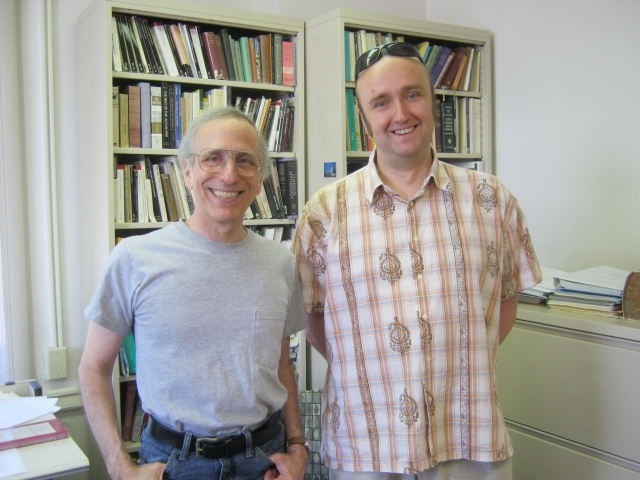
It all would not have been possible without a kind invitation from Professor John Finamore (on the left) who was at that time the Head of the Department of Classics and was very helpful for Mróz to settle in Iowa City, feel comfortable in the Department and do his research work in accordance to the plan. Thank you, John! It was a beneficial semester.
A Successful Project Proposal in Vilnius!
We are very glad to announce that the project proposal submitted by doc. dr Jonas Čiurlionis of Vilnius University to Research Council of Lithuania turned out to be successful! The title of the project in Lithuanian is Antikinės filosofijos recepcija XX a. Vilniaus universitete what translates into English as Reception of Ancient Philosophy in the 20th century Vilnius University.
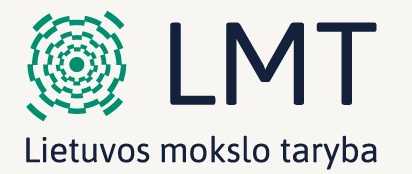
Project will be pursued at the Faculty of Philosophy, Vilnius University (FsF VU), in 2025-2029. The scope of the project covers reception of ancient philosophy among scholars of Vilnius University, starting with the interwar, Polish period of its history, followed by the Soviet times after the World War II, concluding with research on ancient philosophy in free Republic of Lithuania.

The plan of the project includes organising a mid-term seminar meeting in Zielona Góra, an international conference in Vilnius, not to mention conference presentations and journal papers by all the three researchers employed in the project. And they are doc. dr Jonas Čiurlionis, Ph.D., head of the project and senior researcher, dr Mindaugas Stoškus, Ph.D., researcher, both of FsF VU, accompanied by dr hab. Tomasz Mróz, Ph.D., as senior researcher (UZ).
Oral History Team in the Summer
Summer ’25 has come to an end, the work of “Oral History and Classics” International Research Team ended formally in December ’24, but the co-operation on the final results of the project is still going on. The members of the team met in Jan Kadeřábek’s studio in Dymokury, Czech Republic. J. Kadeřábek – Czech film director without whose participation it would have been impossible to shoot all the interviews with classics’ scholars, including three in Poland (M. Wesoły, B. Dembiński, B. Brzuska) – invited Jaroslav Daneš and Tomasz Mróz to do some work together on English subtitles to the first of the Polish interviews – with professor Marian Wesoły.
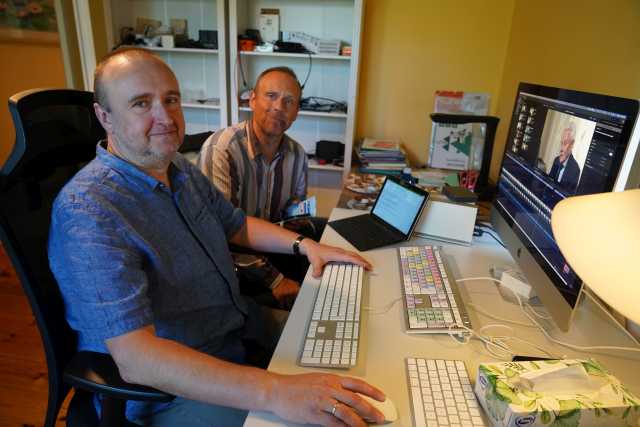
J. Kadeřábek and his wife, Veronika, own a gardening facility in Dymokury, Dymopark, including cactusarium and place for social and family events. More important for the project, however, is his studio with all the equipment and software for professional film edition. It was there that J. Daneš and T. Mróz worked to make the interview with prof. Wesoły available for international audiences. Hopefully, it will be posted in the internet soon and the rest of the interviews will follow.
The First Doctoral Degree by a Member of AΦR Team
On June 24th, 2025, a public defense of Mariam Sargsyan’s (Մարիամ Սարգսյան) doctoral thesis took place in the Institute of Philosophy, University of Zielona Góra (UZ). The title of her dissertation was Henryk Jakubanis (1879–1949) as a Researcher of Ancient Philosophy and Its Reception. The whole event was chaired by prof. Jacek Uglik and it proceeded in accordance with a regular schedule. At the start he curriculum of the candidate was presented by the supervisor, T. Mróz, who stressed the fact that M. Sargsyan was the first international student in the Doctoral School for Humanities and Social Sciences, and the only beneficiary of the research project NCN Preludium bis (with T. Mróz as a PI) and NAWA Preludium bis in the history of UZ.

Then M. Sargsyan took the floor and delineated the main points of her thesis which aimed at providing a synthetic study of H. Jakubanis as a researcher of ancient philosophy. Her study included a discussion of less-known aspects of H. Jakubanis’ life and work, in particular his academic positions in Kyiv; an analysis of his interpretations of selected Greek philosophers (Empedocles and Plato); and an examination of his methods etc.
A particular emphasis was put on the significance of his national sentiments and identity in motivating his decisions and shaping his career path; and on his contribution to the development of research in ancient philosophy and promotion of Polish culture in Kyiv in the early 20th century and subsequently in Lublin during the interwar period. The second part of the presentation was focused on H. Jakubanis scholarly achievements. His works were divided into three groups: 1) a monograph and translation of Empedocles (1906); 2) various studies on Plato and reception of Platonism, including an incomplete manuscript of his final university thesis (1900); 3) works promoting the value of ancient philosophy for general audiences, not only scholars, in the modern age.
One of the most significant results of Sargsyan’s dissertation was an identification three key influences in Jakubanis’ intellectual genealogy. They were: 1) his supervisor, Alexei Gilarov (1856-1938), whose role in forming Jakubanis’ biographical-genetic method and his interpretation of Plato was crucial; 2) Tadeusz Zieliński (1859-1944) and his conviction in the importance of the ancient legacy for modern culture; 3) the works by Eduard Zeller (1814-1908), which exerted impact on Jakubanis’ views on Empedocles and Plato.

On the whole, as Sargsyan’s dissertation demonstrates, Jakubanis was a historian of ancient thought, with a good background in classical languages, whose primary goal as a lecturer and scholar was to promote ancient thought. Contrary to his methods that can be considered today as outdated, his translation of Empedocles’ fragments still circulates in the Russian-speaking world and seems to be his lasting contribution to disseminating Greek philosophy.
The dissertation was assessed by three reviewers, they were prof. Zbigniew Nerczuk (Nicolaus Copernicus University in Toruń), prof. Steffen Huber (Jagiellonian University), and prof. Wiesława Sajdek (Jan Długosz University in Częstochowa). They all were present to read out loud their positive reviews and ask a couple of questions. They were particularly concerned with some ambiguities in Sargsyan’s account of Jakubanis’ career and academic titles he had obtained, since not all the documents have been preserved. Another key issue concerned some lacking points in broader historical and philosophical context of Jakubanis’ views, as Sargsyan preferred to focus on the direct impact exerted on him by the scholars he had referred to or collaborated with.

Finally, after hearing the reviews, questions and answers, the commission decided to award M. Sargsyan with a doctoral degree cum laude. Her dissertation has, no doubt, broadened and deepend the knowledge of the reception of ancient philosophy in Central and Eastern Europe in general, and of Henryk Jakubanis, a scholar writing on history of philosophy, who left his mark on the intellectual life in Poland, Ukraine and Russia, in particular.
After her successful doctoral defence M. Sargsyan returned to Armenia, her homeland, but we all hope here for further collaboration and for funding opportunities to publish her dissertation.
Dear Doctor Sargsyan!
Good luck with your research plans and see you back soon!
Renaissance Platonism in Polish Debates at the symposium in Saint Louis, MO
In June (9th-11th) 2025, Saint Louis University (Saint Louis, Missouri) held the Twelfth Annual Symposium for Medieval and Renaissance Studies (SMRS). This year’s optional theme was Synthesis and Reconciliation.
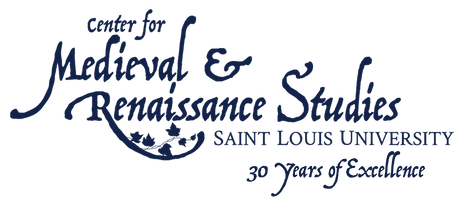
Symposium gathered over a hundred of scholars debating on various aspects of mediaeval and Renaissance studies, but only a couple of papers were devoted to philosophy or historiographical discussions. A booklet including a plentiful schedule, all the sessions, papers etc. can be downloaded here. Tomasz Mróz’s paper was delivered during a session titled Studying Renaissance Literature and Philosophy Through New Eyes. Mróz’s attendance at the SMRS was funded through a “Small Grant” scheme from his home institution, University of Zielona Góra, and his presentation was devoted to Bohdan Kieszkowski: Florentine Platonism between Ideology and World War II: The Case of Bogdan Kieszkowski (1904-1997).
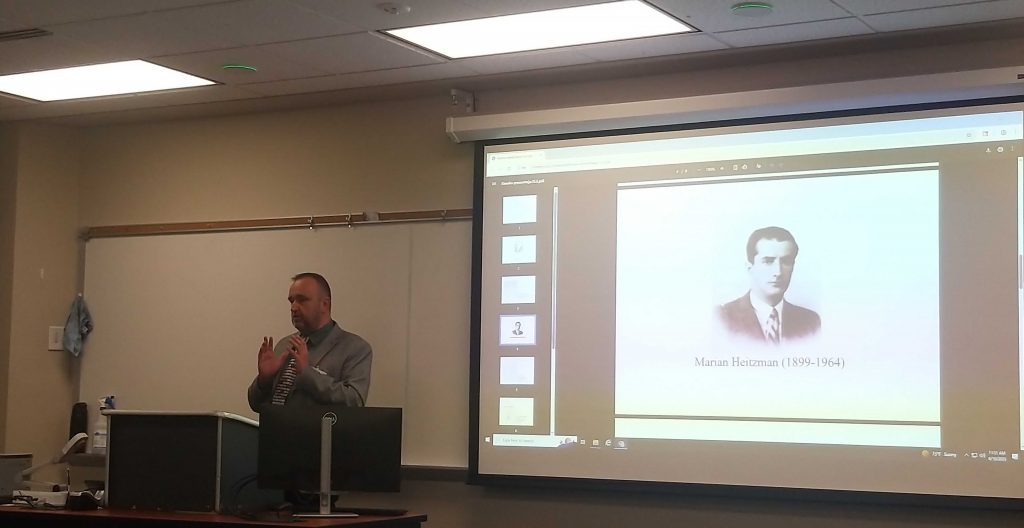
It was for the first time that Kieszkowski’s life and works were presented to international audience. Mróz discussed his biography, including successful beginnings of his academic career in interwar Poland and his later difficult life on the exile in Paris, as well as various hypotheses regarding undocumented period of his life directly following the war. Philosophical part of the paper focused on Kieszkowski’s dispute with Marian Heitzman (1899-1964), who accused him of underestimating the influences of mediaeval neoplatonism on Ficino and it was the role of mediaeval philosophy in forming Renaissance Platonism that turned them against each other. After the war, in 1973, Kieszkowski managed to publish the edition of Pico della Mirandola’s Conclusiones (Geneve 1973). This book was based on the materials he had been able to collect and study in various European libraries before the war and thus his work was far from perfection. Reviews of this book emphasised insufficient accuracy in editing the original Pico’s text, yet his scholarship and experience in Renaissance philosophy were assessed as indisputable. The most eminent and meticulous critic of this late Kieszkowski’s work was a Portuguese scholar, José Vitorino de Pina Martins (1920-2010).
A dozen of scholars attended the session and the questions from the audience were concerned both with biographical and philosophical parts of the paper, that is, with Kieszkowski’s later life on exile as a possible consequence of a PTSD resulting from his serious bullet wounds and subsequent disabilities, and with the connection between the developments of neo-Scholasticism in Poland and Europe and resulting appreciation of the role of mediaeval culture and philosophy.
Recent commentaries